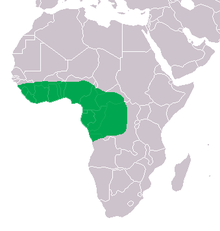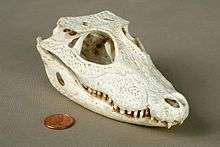Dwarf crocodile
| Dwarf crocodile | |
|---|---|
| | |
| Dwarf crocodile | |
| Scientific classification | |
| Kingdom: | Animalia |
| Phylum: | Chordata |
| Subphylum: | Vertebrata |
| Class: | Reptilia |
| Order: | Crocodilia |
| Family: | Crocodylidae |
| Genus: | Osteolaemus Cope, 1861 |
| Species: | O. tetraspis |
| Binomial name | |
| Osteolaemus tetraspis Cope, 1861 | |
| Subspecies | |
| |
 | |
| Range of the dwarf crocodile in green | |
The dwarf crocodile (Osteolaemus tetraspis), also known commonly as the African dwarf crocodile, broad-snouted crocodile, or bony crocodile, is an African crocodile that is also the smallest extant crocodile species. Recent sampling has identified three genetically distinct populations. Some feel that the findings should elevate the subspecies to full species status.
Taxonomy and etymology
Osteolaemus tetraspis is currently the only species included in the genus Osteolaemus, with two recognized subspecies:
The second subspecies has had a somewhat convoluted taxonomical history. It was first described as Osteoblepharon osborni by Schmidt in 1919, based on a few specimens from the Upper Congo Basin in what is now the Democratic Republic of Congo. However, Inger in a 1948 paper found the specimens wanting of characteristics that would justify a generic separation from Osteolaemus and referred the specimens to Osteolaemus osborni. Later, Wermuth and Mertens (1961), reduced it to the current subspecies rank.
Recent evidence from the analysis of DNA indicates that three distinctly different populations of Osteolaemus may merit full species recognition. These would be O. tetrapis, O. osborni, and a third currently unnamed species.[1]
Etymology
The generic name, Osteolaemus, means "bony throat", and is derived from the Ancient Greek όστεον (bone) and λαιμός (throat). The genus was named as such due to the osteoderms found among the scales in the neck and belly.
The specific epithet, tetraspis, means "four shields", and derives from the Ancient Greek τετρα (four) and ασπίς (shield), as the back of the neck has four large, shield-like scales.
The subspecific name, osborni, is in honor of American paleontologist Henry Fairfield Osborn.[2]
Characteristics

Dwarf crocodiles attain a medium adult length of 1.5 m (4.9 ft), though the maximum recorded length for this species is 1.9 m (6.2 ft). Adult specimens typically weigh between 18 and 32 kg (40 and 71 lb), with the largest females weighing up to 40 kg (88 lb) and the largest males weighing 80 kg (180 lb).[3][4] Adults are a uniform black on their backs and sides with a yellowish underside with black patches. Juveniles have a lighter brown banding on body and tails and yellow patterns on the head.
As a result of its small size and heightened vulnerability to predation, this species of crocodile has a heavily armoured neck, back, and tail and also has osteoderms on its belly and underside of neck.
Osteolaemus has a blunt short snout, as long as it is wide, similar in fact to that of a dwarf caiman, probably a result of occupying a similar ecological niche. The dentition consists of four premaxillary teeth, 12 to 13 on the maxilla, and 14 to 15 on the dentary bone.
O. t. tetraspis has lighter colours, a more pointed, upturned snout, and more body armour than O. t. osborni.
Distribution and habitat
Dwarf crocodiles range across tropical lowland regions of sub-Saharan West Africa and West Central Africa. Such a distribution greatly overlaps with that of the slender-snouted crocodile, encompassing countries as far west as Senegal, reaching the Central African Republic in the east, and ranging as southerly as Angola. The subspecies O. t. tetraspis is found mainly in the westerly reaches of this range, while O. t. osborni is restricted to the Democratic Republic of Congo's rain forest.
Osteolaemus individuals reside in permanent ponds in swamps and areas of slight current of rain forest rivers, though reports exist of dwarf crocodiles in isolated pools in the savannah, where burrows are dug to aestivate during the dry season.
Biology and behaviour
The dwarf crocodile is a slow, timid, and mainly nocturnal reptile. As with all crocodilians, it is an adept predator of vertebrates, large invertebrates such as crustaceans, and when presented with the opportunity, carrion. Foraging is mainly done in or near the water, though in areas with substantial ground cover, they may expand their feeding pattern to land in extensive forays, especially following rains.
The Congo Basin subspecies demonstrates seasonality in its dietary regimen, feeding on fish during the wet season's floods. When faced with the scarceness of food during the dry season, individuals turn to crustaceans, and food intake is generally reduced.
True to its solitary, nocturnal nature, a dwarf crocodile digs out a burrow in which to hide and rest during the day, which can sometimes have a submerged entrance. An individual lacking the right conditions to do so usually lives between tree roots that hang over the ponds where it lives.
Reproduction
Interacting closely only in breeding season, female dwarf crocodiles build their nest mounds at the beginning of the wet season, which spans May and June. The nest, situated near the water, is a mound of wet, decaying vegetation that incubates the eggs due to the heat generated by the decomposition of the plant material. A small number of eggs is laid, usually about 10, though in extreme cases up to 20, and they incubate in 85 to 105 days. Hatchlings measure 28 cm when emerging from the eggs. The female guards the nest during the incubation period, and after the eggs hatch, she watches over the young for an unknown period of time, as young can be eaten by a great range of predators (birds, fish, mammals and reptiles, including other crocodiles).
Conservation
Dwarf crocodiles are a little-known species, so unlike their more studied relatives, conservationists are not as aware of how their populations are faring under the growing human pressure over the ecosystems where they abide. Survey data, when available, show some degree of decline, either by hunting for bush meat or habitat loss due to deforestation. However, it is a widely spread, and presumably numerous species, so is not as endangered as other forest denizens.
Though some skins are used in local manufacturing of leather products, they are of poor quality, so little interest is shown in captive breeding or a sustainable use program.
References
- ↑ Eaton, Mitchell J.; Andrew Martin; John Thorbjarnarson; George Amato (March 2009). "Species-level diversification of African dwarf crocodiles (Genus Osteolaemus): A geographic and phylogenetic perspective". Molecular Phylogenetics and Evolution. 50 (3): 496–506. doi:10.1016/j.ympev.2008.11.009.
- ↑ Beolens, Bo; Michael Watkins; Michael Grayson (2011). The Eponym Dictionary of Reptiles. Baltimore: Johns Hopkins University Press. xiii + 296 pp. ISBN 978-1-4214-0135-5. (Osteolaemus osborni, p. 196).
- ↑
- ↑
Further reading
| Wikispecies has information related to: Osteolaemus tetraspis |
| Wikimedia Commons has media related to Osteolaemus tetraspis. |
- Dwarf crocodile at the Encyclopedia of Life
- Osteolaemus tetraspis@Crocodilian Species List
- Osteolaemus tetraspis@Crocodile Status Survey and Conservation Action Plan - Second Edition
